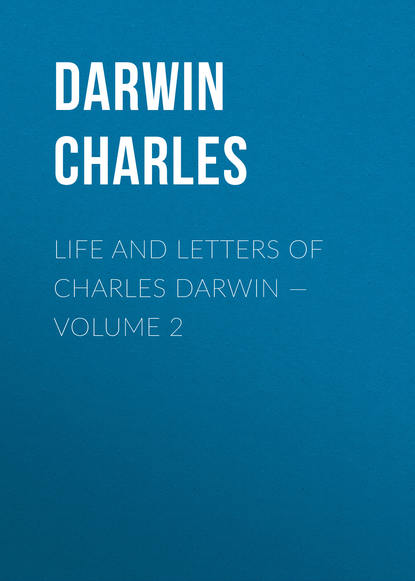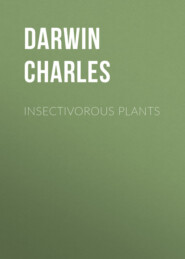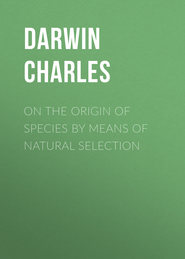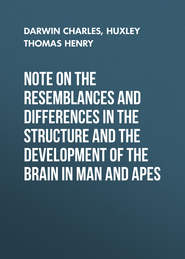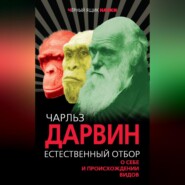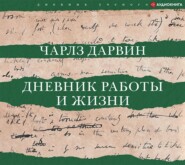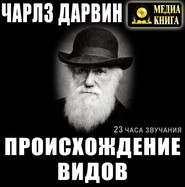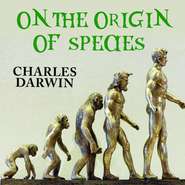По всем вопросам обращайтесь на: info@litportal.ru
(©) 2003-2024.
✖
Life and Letters of Charles Darwin — Volume 2
Настройки чтения
Размер шрифта
Высота строк
Поля
The coarse stratification has sometimes been disturbed. I find that you allude "to the larger stones often standing on end;" and this is the point which struck me so much. Not only moderately sized angular stones, but small oval pebbles often stand vertically up, in a manner which I have never seen in ordinary gravel beds. This fact reminded me of what occurs near my home, in the stiff red clay, full of unworn flints over the chalk, which is no doubt the residue left undissolved by rain water. In this clay, flints as long and thin as my arm often stand perpendicularly up; and I have been told by the tank-diggers that it is their "natural position!" I presume that this position may safely be attributed to the differential movement of parts of the red clay as it subsided very slowly from the dissolution of the underlying chalk; so that the flints arrange themselves in the lines of least resistance. The similar but less strongly marked arrangement of the stones in the drift near Southampton makes me suspect that it also must have slowly subsided; and the notion has crossed my mind that during the commencement and height of the glacial period great beds of frozen snow accumulated over the south of England, and that, during the summer, gravel and stones were washed from the higher land over its surface, and in superficial channels. The larger streams may have cut right through the frozen snow, and deposited gravel in lines at the bottom. But on each succeeding autumn, when the running water failed, I imagine that the lines of drainage would have been filled up by blown snow afterwards congealed, and that, owing to great surface accumulations of snow, it would be a mere chance whether the drainage, together with gravel and sand, would follow the same lines during the next summer. Thus, as I apprehend, alternate layers of frozen snow and drift, in sheets and lines, would ultimately have covered the country to a great thickness, with lines of drift probably deposited in various directions at the bottom by the larger streams. As the climate became warmer, the lower beds of frozen snow would have melted with extreme slowness, and the many irregular beds of interstratified drift would have sunk down with equal slowness; and during this movement the elongated pebbles would have arranged themselves more or less vertically. The drift would also have been deposited almost irrespective of the outline of the underlying land. When I viewed the country I could not persuade myself that any flood, however great, could have deposited such coarse gravel over the almost level platforms between the valleys. My view differs from that of Holst, page 415 ['Great Ice Age'], of which I had never heard, as his relates to channels cut through glaciers, and mine to beds of drift interstratified with frozen snow where no glaciers existed. The upshot of this long letter is to ask you to keep my notion in your head, and look out for upright pebbles in any lowland country which you may examine, where glaciers have not existed. Or if you think the notion deserves any further thought, but not otherwise, to tell any one of it, for instance Mr. Skertchly, who is examining such districts. Pray forgive me for writing so long a letter, and again thanking you for the great pleasure derived from your book,
I remain yours very faithfully, CH. DARWIN.
P.S... I am glad that you have read Blytt (Axel Blytt. — 'Essay on the Immigration of the Norwegian Flora during alternate rainy and dry Seasons.' Christiania, 1876.); his paper seemed to me a most important contribution to Botanical Geography. How curious that the same conclusions should have been arrived at by Mr. Skertchly, who seems to be a first-rate observer; and this implies, as I always think, a sound theoriser.
I have told my publisher to send you in two or three days a copy (second edition) of my geological work during the voyage of the "Beagle". The sole point which would perhaps interest you is about the steppe-like plains of Patagonia.
For many years past I have had fearful misgivings that it must have been the level of the sea, and not that of the land which has changed.
I read a few months ago your [brother's] very interesting life of Murchison. (By Mr. Archibald Geikie.) Though I have always thought that he ranked next to W. Smith in the classification of formations, and though I knew how kind-hearted [he was], yet the book has raised him greatly in my respect, notwithstanding his foibles and want of broad philosophical views.
[The only other geological work of his later years was embodied in his book on earthworms (1881), which may therefore be conveniently considered in this place. This subject was one which had interested him many years before this date, and in 1838 a paper on the formation of mould was published in the Proceedings of the Geological Society (see volume i.).
Here he showed that "fragments of burnt marl, cinders, etc., which had been thickly strewed over the surface of several meadows were found after a few years lying at a depth of some inches beneath the turf, but still forming a layer." For the explanation of this fact, which forms the central idea of the geological part of the book, he was indebted to his uncle Josiah Wedgwood, who suggested that worms, by bringing earth to the surface in their castings, must undermine any objects lying on the surface and cause an apparent sinking.
In the book of 1881 he extended his observations on this burying action, and devised a number of different ways of checking his estimates as to the amount of work done. (He received much valuable help from Dr. King, of the Botanical Gardens, Calcutta. The following passage is from a letter to Dr. King, dated January 18, 1873: —
"I really do not know how to thank you enough for the immense trouble which you have taken. You have attended EXACTLY and FULLY to the points about which I was most anxious. If I had been each evening by your side, I could not have suggested anything else.") He also added a mass of observations on the habits, natural history and intelligence of worms, a part of the work which added greatly to its popularity.
In 1877 Sir Thomas Farrer had discovered close to his garden the remains of a building of Roman-British times, and thus gave my father the opportunity of seeing for himself the effects produced by earthworms' work on the old concrete-floors, walls, etc. On his return he wrote to Sir Thomas Farrer:
"I cannot remember a more delightful week than the last. I know very well that E. will not believe me, but the worms were by no means the sole charm."
In the autumn of 1880, when the 'Power of Movement in Plants' was nearly finished, he began once more on the subject. He wrote to Professor Carus (September 21): —
"In the intervals of correcting the press, I am writing a very little book, and have done nearly half of it. Its title will be (as at present designed) 'The Formation of Vegetable Mould through the Action of Worms.' (The full title is 'The Formation of Vegetable Mould through the Action of Worms with Observations on their Habits,' 1881.) As far as I can judge it will be a curious little book."
The manuscript was sent to the printers in April, 1881, and when the proo-sheets were coming in he wrote to Professor Carus: "The subject has been to me a hobby-horse, and I have perhaps treated it in foolish detail."
It was published on October 10, and 2000 copies were sold at once. He wrote to Sir J.D. Hooker, "I am glad that you approve of the 'Worms.' When in old days I used to tell you whatever I was doing, if you were at all interested, I always felt as most men do when their work is finally published."
To Mr. Mellard Reade he wrote (November 8): "It has been a complete surprise to me how many persons have cared for the subject." And to Mr. Dyer (in November): "My book has been received with almost laughable enthusiasm, and 3500 copies have been sold!!!" Again, to his friend Mr. Anthony Rich, he wrote on February 4, 1882, "I have been plagued with an endless stream of letters on the subject; most of them very foolish and enthusiastic; but some containing good facts which I have used in correcting yesterday the 'Sixth Thousand.'" The popularity of the book may be roughly estimated by the fact that, in the three years following its publication, 8500 copies were sold — a sale relatively greater than that of the 'Origin of Species.'
It is not difficult to account for its success with the non-scientific public. Conclusions so wide and so novel, and so easily understood, drawn from the study of creatures so familiar, and treated with unabated vigour and freshness, may well have attracted many readers. A reviewer remarks: "In the eyes of most men... the earthworm is a mere blind, dumb, senseless, and unpleasantly slimy annelid. Mr. Darwin undertakes to rehabilitate his character, and the earthworm steps forth at once as an intelligent and beneficent personage, a worker of vast geological changes, a planer down of mountain sides... a friend of man... and an ally of the Society for the preservation of ancient monuments." The "St. James Gazette", October 17, 1881, pointed out that the teaching of the cumulative importance of the infinitely little is the point of contact between this book and the author's previous work.
One more book remains to be noticed, the 'Life of Erasmus Darwin.'
In February 1879 an essay by Dr. Ernst Krause, on the scientific work of Erasmus Darwin, appeared in the evolutionary journal, 'Kosmos.' The number of 'Kosmos' in question was a "Gratulationsheft" (The same number contains a good biographical sketch of my father, of which the material was to a large extent supplied by him to the writer, Professor Preyer of Jena. The article contains an excellent list of my father's publications.), or special congratulatory issue in honour of my father's birthday, so that Dr. Krause's essay, glorifying the older evolutionist, was quite in its place. He wrote to Dr. Krause, thanking him cordially for the honour paid to Erasmus, and asking his permission to publish (The wish to do so was shared by his brother, Erasmus Darwin the younger, who continued to be associated with the project.) an English translation of the Essay.
His chief reason for writing a notice of his grandfather's life was "to contradict flatly some calumnies by Miss Seward." This appears from a letter of March 27, 1879, to his cousin Reginald Darwin, in which he asks for any documents and letters which might throw light on the character of Erasmus. This led to Mr. Reginald Darwin placing in my father's hands a quantity of valuable material, including a curious folio common-place book, of which he wrote: "I have been deeply interested by the great book... reading and looking at it is like having communion with the dead...[it] has taught me a good deal about the occupations and tastes of our grandfather." A subsequent letter (April 8) to the same correspondent describes the source of a further supply of material: —
Since my last letter I have made a strange discovery; for an old box from my father marked "Old Deeds," and which consequently I had never opened, I found full of letters — hundreds from Dr. Erasmus — and others from old members of the Family: some few very curious. Also a drawing of Elston before it was altered, about 1750, of which I think I will give a copy."
Dr. Krause's contribution formed the second part of the 'Life of Erasmus Darwin,' my father supplying a "preliminary notice." This expression on the title-page is somewhat misleading; my father's contribution is more than half the book, and should have been described as a biography. Work of this kind was new to him, and he wrote doubtfully to Mr. Thiselton Dyer, June 18th: "God only knows what I shall make of his life, it is such a new kind of work to me." The strong interest he felt about his forebears helped to give zest to the work, which became a decided enjoyment to him. With the general public the book was not markedly successful, but many of his friends recognised its merits. Sir J.D. Hooker was one of these, and to him my father wrote, "Your praise of the Life of Dr. D. has pleased me exceedingly, for I despised my work, and thought myself a perfect fool to have undertaken such a job."
To Mr. Galton, too, he wrote, November 14: —
"I am EXTREMELY glad that you approve of the little 'Life' of our grandfather, for I have been repenting that I ever undertook it, as the work was quite beyond my tether."
The publication of the 'Life of Erasmus Darwin' led to an attack by Mr. Samuel Butler, which amounted to a charge of falsehood against my father. After consulting his friends, he came to the determination to leave the charge unanswered, as unworthy of his notice. (He had, in a letter to Mr. Butler, expressed his regret at the oversight which caused so much offence.) Those who wish to know more of the matter, may gather the facts of the case from Ernst Krause's 'Charles Darwin,' and they will find Mr. Butler's statement of his grievance in the "Athenaeum", January 31, 1880, and in the "St. James's Gazette", December 8, 1880. The affair gave my father much pain, but the warm sympathy of those whose opinion he respected soon helped him to let it pass into a well-merited oblivion.
The following letter refers to M. J.H. Fabre's 'Souvenirs Entomologiques.' It may find a place here, as it contains a defence of Erasmus Darwin on a small point. The postscript is interesting, as an example of one of my father's bold ideas both as to experiment and theory:]
CHARLES DARWIN TO J.H. FABRE. Down, January 31, 1880.
My dear Sir,
I hope that you will permit me to have the satisfaction of thanking you cordially for the lively pleasure which I have derived from reading your book. Never have the wonderful habits of insects been more vividly described, and it is almost as good to read about them as to see them. I feel sure that you would not be unjust to even an insect, much less to a man. Now, you have been misled by some translator, for my grandfather, Erasmus Darwin, states ('Zoonomia,' volume i. page 183, 1794) that it was a wasp (guepe) which he saw cutting off the wings of a large fly. I have no doubt that you are right in saying that the wings are generally cut off instinctively; but in the case described by my grandfather, the wasp, after cutting off the two ends of the body, rose in the air, and was turned round by the wind; he then alighted and cut off the wings. I must believe, with Pierre Huber, that insects have "une petite dose de raison." In the next edition of your book, I hope that you will alter PART of what you say about my grandfather.
I am sorry that you are so strongly opposed to the Descent theory; I have found the searching for the history of each structure or instinct an excellent aid to observation; and wonderful observer as you are, it would suggest new points to you. If I were to write on the evolution of instincts, I could make good use of some of the facts which you give. Permit me to add, that when I read the last sentence in your book, I sympathised deeply with you. (The book is intended as a memorial of the early death of M. Fabre's son, who had been his father's assistant in his observations on insect life.)
With the most sincere respect, I remain, dear Sir, yours faithfully, CHARLES DARWIN.
P.S. — Allow me to make a suggestion in relation to your wonderful account of insects finding their way home. I formerly wished to try it with pigeons: namely, to carry the insects in their paper "cornets," about a hundred paces in the opposite direction to that which you ultimately intended to carry them; but before turning round to return, to put the insect in a circular box, with an axle which could be made to revolve very rapidly, first in one direction, and then in another, so as to destroy for a time all sense of direction in the insects. I have sometimes IMAGINED that animals may feel in which direction they were at the first start carried. (This idea was a favourite one with him, and he has described in 'Nature' (volume vii. 1873, page 360) the behaviour of his cob Tommy, in whom he fancied he detected a sense of direction. The horse had been taken by rail from Kent to the Isle of Wight; when there he exhibited a marked desire to go eastward, even when his stable lay in the opposite direction. In the same volume of 'Nature,' page 417, is a letter on the 'Origin of Certain Instincts,' which contains a short discussion on the sense of direction.) If this plan failed, I had intended placing the pigeons within an induction coil, so as to disturb any magnetic or dia-magnetic sensibility, which it seems just possible that they may possess.
C.D.
[During the latter years of my father's life there was a growing tendency in the public to do him honour. In 1877 he received the honorary degree of LL.D. from the University of Cambridge. The degree was conferred on November 17, and with the customary Latin speech from the Public Orator, concluding with the words: "Tu vero, qui leges naturae tam docte illustraveris, legum doctor nobis esto."
The honorary degree led to a movement being set on foot in the University to obtain some permanent memorial of my father. A sum of about 400 pounds was subscribed, and after the rejection of the idea that a bust would be the best memorial, a picture was determined on. In June 1879 he sat to Mr. W. Richmond for the portrait in the possession of the University, now placed in the Library of the philosophical Society at Cambridge. He is represented seated in his Doctor's gown, the head turned towards the spectator: the picture has many admirers, but, according to my own view, neither the attitude nor the expression are characteristic of my father.
A similar wish on the part of the Linnean Society — with which my father was so closely associated — led to his sitting in August, 1881, to Mr. John Collier, for the portrait now in the possession of the Society. Of the artist, he wrote, "Collier was the most considerate, kind and pleasant painter a sitter could desire." The portrait represents him standing facing the observer in the loose cloak so familiar to those who knew him, and with his slouch hat in his hand. Many of those who knew his face most intimately, think that Mr. Collier's picture is the best of the portraits, and in this judgment the sitter himself was inclined to agree. According to my feeling it is not so simple or strong a representation of him as that given by Mr. Ouless. There is a certain expression in Mr. Collier's portrait which I am inclined to consider an exaggeration of the almost painful expression which Professor Cohn has described in my father's face, and which he had previously noticed in Humboldt. Professor Cohn's remarks occur in a pleasantly written account of a visit to Down in 1876, published in the "Breslauer Zeitung", April 23, 1882. (In this connection may be mentioned a visit (1881) from another distinguished German, Hans Richter. The occurrence is otherwise worthy of mention, inasmuch as it led to the publication, after my father's death, of Herr Richter's recollections of the visit. The sketch is simply and sympathetically written, and the author has succeeded in giving a true picture of my father as he lived at Down. It appeared in the "Neue Tagblatt" of Vienna, and was republished by Dr. O. Zacharias in his 'Charles R. Darwin,' Berlin, 1882.)
Besides the Cambridge degree, he received about the same time honours of an academic kind from some foreign societies.
On August 5, 1878, he was elected a Corresponding Member of the French Institute ("Lyell always spoke of it as a great scandal that Darwin was so long kept out of the French Institute. As he said, even if the development hypothesis were objected to, Darwin's original works on Coral Reefs, the Cirripedia, and other subjects, constituted a more than sufficient claim" — From Professor Judd's notes.), in the Botanical Section, and wrote to Dr. Asa Gray: —
"I see that we are both elected Corresponding Members of the Institute. It is rather a good joke that I should be elected in the Botanical Section, as the extent of my knowledge is little more than that a daisy is a Compositous plant and a pea a Leguminous one."
(The statement has been more than once published that he was elected to the Zoological Section, but this was not the case.
He received twenty-six votes out of a possible 39, five blank papers were sent in, and eight votes were recorded for the other candidates.
In 1872 an attempt had been made to elect him to the Section of Zoology, when, however, he only received 15 out of 48 votes, and Loven was chosen for the vacant place. It appears ('Nature,' August 1, 1872) that an eminent member of the Academy wrote to "Les Mondes" to the following effect: —
"What has closed the doors of the Academy to Mr. Darwin is that the science of those of his books which have made his chief title to fame-the 'Origin of Species,' and still more the 'Descent of Man,' is not science, but a mass of assertions and absolutely gratuitous hypotheses, often evidently fallacious. This kind of publication and these theories are a bad example, which a body that respects itself cannot encourage.")
In the early part of the same year he was elected a Corresponding Member of the Berlin Academy of Sciences, and he wrote (March 12) to Professor Du Bois Reymond, who had proposed him for election: —
"I thank you sincerely for your most kind letter, in which you announce the great honour conferred on me. The knowledge of the names of the illustrious men, who seconded the proposal is even a greater pleasure to me than the honour itself."
The seconders were Helmholtz, Peters, Ewald, Pringsheim and Virchow.
In 1879 he received the Baly Medal of the Royal College of Physicians. (The visit to London, necessitated by the presentation of the Baly Medal, was combined with a visit to Miss Forster's house at Abinger, in Surrey, and this was the occasion of the following characteristic letter: — "I must write a few words to thank you cordially for lending us your house. It was a most kind thought, and has pleased me greatly; but I know well that I do not deserve such kindness from any one. On the other hand, no one can be too kind to my dear wife, who is worth her weight in gold many times over, and she was anxious that I should get some complete rest, and here I cannot rest. Your house will be a delightful haven and again I thank you truly.")
Again in 1879 he received from the Royal Academy of Turin the "Bressa" prize for the years 1875-78, amounting to the sum of 12,000 francs. In the following year he received on his birthday, as on previous occasions, a kind letter of congratulation from Dr. Dohrn of Naples. In writing (February 15th) to thank him and the other naturalists at the Zoological Station, my father added: —
"Perhaps you saw in the papers that the Turin Society honoured me to an extraordinary degree by awarding me the "Bressa" Prize. Now it occurred to me that if your station wanted some pieces of apparatus, of about the value of 100 pounds, I should very much like to be allowed to pay for it. Will you be so kind as to keep this in mind, and if any want should occur to you, I would send you a cheque at any time."





